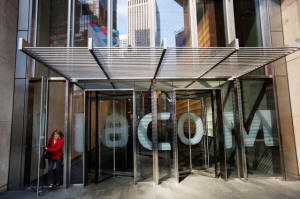|
Viacom investors pay
CEO's legal bills in Redstone spat
 Send a link to a friend
Send a link to a friend
 [June 18, 2016]
By Jessica Toonkel [June 18, 2016]
By Jessica Toonkel
(Reuters) - Viacom Inc disclosed on Friday
it would foot the bill for embattled Chief Executive Officer Philippe
Dauman's legal fight against controlling shareholder Sumner Redstone,
even as Wall Street cheers the executive's potential departure.
The disconnect demonstrates the complicated corporate governance
challenge Viacom's board is facing in the battle for control of
Redstone's $40 billion media empire, which includes CBS Corp and
Viacom, investors and corporate governance experts said.
"I don't think it's appropriate to use shareholder money for the
suit," said Ben Strubel, a principal with Lancaster,
Pennsylvania-based wealth manager Strubel Investment Management,
which owns non-voting shares of Viacom. "I don't think it's
appropriate to use shareholder money toward his compensation given
the company's performance."
Viacom, which owns Comedy Central, Nickelodeon, MTV and Paramount,
has been struggling to turn around its ratings. Reflecting some of
that weakness, the company's stock is down nearly 50 percent over
the past two years.
On Friday, Viacom said its third-quarter profit would fall well
short of Wall Street expectations, citing a disappointing domestic
box office haul from its latest Teenage Mutant Ninja Turtles movie
and disruption stemming from all the controversy.

Viacom's stock has risen about 15 percent since May 20, when
Redstone removed Dauman and board member George Abrams from the
seven-person trust that will ultimately control Redstone's media
empire. About half of that rally came on Thursday when Redstone
ousted Dauman and four others from the Viacom board.
Viacom shares fell 1.4 percent to close at $44.42 on Friday.
If a judge affirms the new slate of directors, they have the
authority to overhaul Viacom management, which may include Dauman.
If he is removed, he could potentially receive nearly $90 million in
severance, according to compensation consultant Equilar.
Still, Viacom's board, led by lead independent director Fred
Salerno, has argued that 93-year-old Redstone, who they believe is
being manipulated by his daughter Shari, is not the one making
decisions in the best interest of all shareholders.
ďOn the very day that Mr. Redstoneís representatives acted to remove
Mr. Dauman and Mr. Abrams, they made it clear the issue was about
control of Viacom. It is clearly in the interests of all of Viacomís
stockholders that the Massachusetts actions be pursued in order to
preserve the independence of Viacomís board."
The fight over control between Dauman and Redstone is playing out in
courtrooms in Delaware, Massachusetts and California.
In a May 23 lawsuit filed in Massachusetts, Dauman and Abrams are
contesting their removal from Redstone's family trust and the board
of National Amusements Inc, the holding company for Redstone's
voting shares. The trust will control Redstone's stake after he dies
or is declared mentally incompetent.
National Amusements, in a statement on Friday, said there was "no
justification" for Viacom's funding of the legal fight against
Sumner Redstone. "The need for strong, independent oversight of
Viacom could not be more apparent," the statement said.
[to top of second column] |

A woman exits the Viacom Inc. headquarters in New York April 30,
2013. REUTERS/Lucas Jackson

The fact that the company is funding a lawsuit from its CEO against its
controlling shareholder points to the complexities of having a family run a
multi-billion dollar company, said corporate governance consultant Francis Byrd.
"It does appear to be unseemly but these are the sorts of complications you find
with a controlled company where the family drama can easily bleed into the
corporate operations," Byrd said.
Naveen Sarma, a credit analyst with Standard & Poor's, said he would have
preferred the board stay out of the power struggle.
"We would rather they would have remained an observer but they have chosen to
take sides," he said. The ratings agency last month lowered its corporate
governance rating of Viacom from satisfactory to fair, due to the uncertainty
engulfing the company.
Standard & Poor's is watching whether the power struggle affects the company's
operations, Sarma said.
The company itself now acknowledges that the legal drama is hurting its bottom
line.
On Friday, Viacom said its third-quarter earnings will miss Wall Street
estimates, marking the first time since October 2008 that it has put out such
guidance.
The company cited the Teenage Mutant Ninja Turtles movie and a delay in
completing an agreement with an unnamed streaming video provider. It also blamed
the latter on "the recent and highly public governance controversy."
The media company also said it expects domestic ad sales to decline about 4
percent in the third quarter ending June 30, an improvement from last quarter's
decline of 5 percent.

Viacom said it expects adjusted earnings of about $1.00 to $1.05 per share in
the quarter. Analysts, on average, were expecting a profit of $1.38 per share,
according to Thomson Reuters I/B/E/S.
(Reporting by Anya George Tharakan in Bengaluru and Anna Driver in New York;
Editing by Nick Zieminski and Bernard Orr)
[© 2016 Thomson Reuters. All rights
reserved.] Copyright 2016 Reuters. All rights reserved. This material may not be published,
broadcast, rewritten or redistributed. |